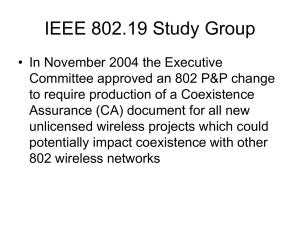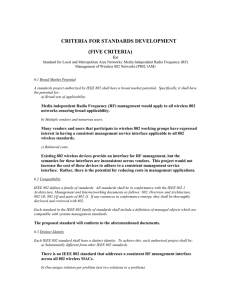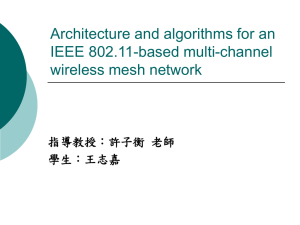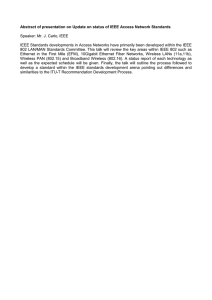CRITERIA FOR STANDARDS DEVELOPMENT (FIVE CRITERIA)
advertisement
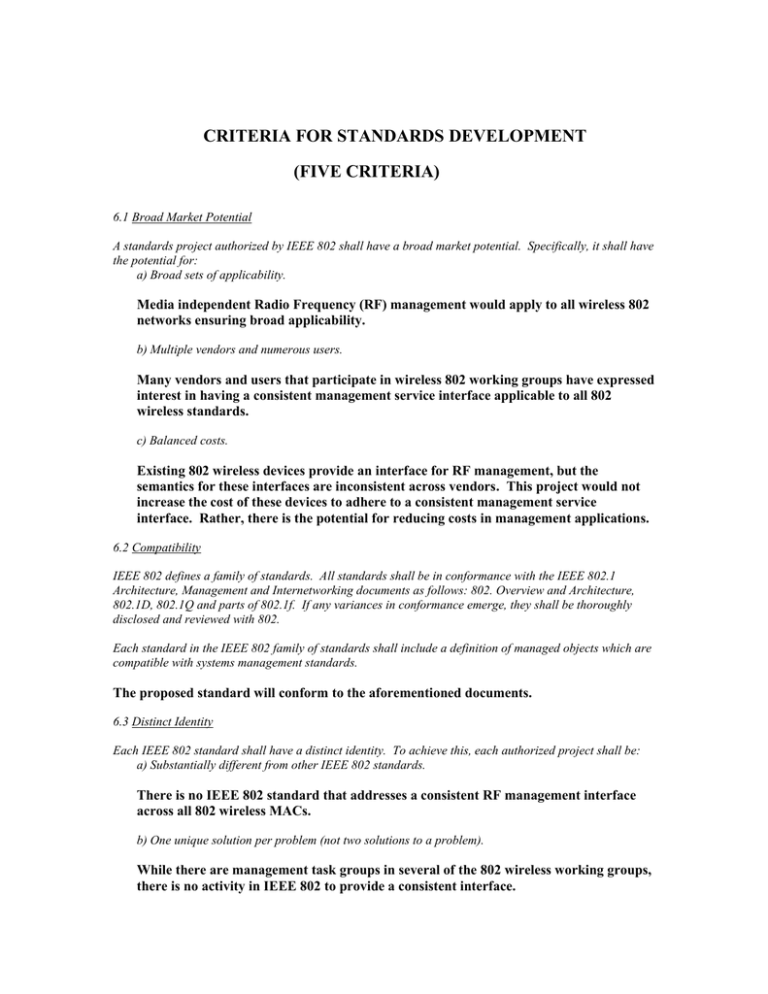
CRITERIA FOR STANDARDS DEVELOPMENT (FIVE CRITERIA) 6.1 Broad Market Potential A standards project authorized by IEEE 802 shall have a broad market potential. Specifically, it shall have the potential for: a) Broad sets of applicability. Media independent Radio Frequency (RF) management would apply to all wireless 802 networks ensuring broad applicability. b) Multiple vendors and numerous users. Many vendors and users that participate in wireless 802 working groups have expressed interest in having a consistent management service interface applicable to all 802 wireless standards. c) Balanced costs. Existing 802 wireless devices provide an interface for RF management, but the semantics for these interfaces are inconsistent across vendors. This project would not increase the cost of these devices to adhere to a consistent management service interface. Rather, there is the potential for reducing costs in management applications. 6.2 Compatibility IEEE 802 defines a family of standards. All standards shall be in conformance with the IEEE 802.1 Architecture, Management and Internetworking documents as follows: 802. Overview and Architecture, 802.1D, 802.1Q and parts of 802.1f. If any variances in conformance emerge, they shall be thoroughly disclosed and reviewed with 802. Each standard in the IEEE 802 family of standards shall include a definition of managed objects which are compatible with systems management standards. The proposed standard will conform to the aforementioned documents. 6.3 Distinct Identity Each IEEE 802 standard shall have a distinct identity. To achieve this, each authorized project shall be: a) Substantially different from other IEEE 802 standards. There is no IEEE 802 standard that addresses a consistent RF management interface across all 802 wireless MACs. b) One unique solution per problem (not two solutions to a problem). While there are management task groups in several of the 802 wireless working groups, there is no activity in IEEE 802 to provide a consistent interface. c) Easy for the document reader to select the relevant specification. The proposed standard will be a new specification and clearly identifiable. A SMIv2 Management Information Base (MIB) module will be made available in text format for use by network management applications. 6.4 Technical Feasibility For a project to be authorized, it shall be able to show its technical feasibility. At a minimum, the proposed project shall show: a) Demonstrated system feasibility. Existing 802 wireless devices already provide an RF management interface indicating system feasibility. b) Proven technology, reasonable testing. Examples of RF management interfaces exist today. c) Confidence in reliability. A consistent management service interface is expected to be more reliable than current inconsistent solutions. d) Coexistence of 802 wireless standards specifying devices for unlicensed operation The working group proposing a wireless project is required to demonstrate Coexistence through the preparation of a Coexistence Assurance (CA) document unless it is not applicable. Task Group will not create a CA document Reason it is not applicable: ____________________________________ This task group is not creating a new wireless MAC/PHY. This consistent RF management interface facilitates cognizance and by that virtue, enables coexistence. 6.5 Economic Feasibility For a project to be authorized, it shall be able to show economic feasibility (so far as can reasonably be estimated), for its intended applications. At a minimum, the proposed project shall show: a) Known cost factors, reliable data. There are several commercially viable RF management solutions available in the market today. b) Reasonable cost for performance. It is not anticipated that adherence to this proposed specification would add cost to implementations. c) Consideration of installation costs. A consistent RF management interface across all wireless 802 MACs would reduce installation costs.
